TAMPA, Fla. — After learning neighbors at Robles Park Village had been living on top of caskets from Zion Cemetery, a forgotten African American burial ground in Tampa, the Tampa Housing Authority immediately began making plans for families to move.
As of Dec. 31, 23 of the 29 impacted families have been relocated. THA assisted them with the relocation process and also made counseling available.
This is the story of Dania Wiles. She now lives in Belmont Heights Estates. It’s another property owned by the Tampa Housing Authority, but it's a vast improvement from the outdated, barrack-style housing Wiles lived in at Robles Park Village.
RELATED: How can we stop historic cemeteries from disappearing? Archaeologists say strengthen the law
Editor's note: This conversation has been edited for clarity
REPORTER EMERALD MORROW: Tell me about your new place and how you’re liking the neighborhood
DANIA WILES: I love it over here. It's very quiet. We have a lot of amenities that is comfortable. We have air, ceiling fans and the neighborhood is better than where we was.
At night time, you don't hear no shooting or nothing going on on this side. And you comfortable. You in your own skin. You ain't got to worry about stepping out on your porch and worrying about gunfire.
MORROW: You once lived on top of a cemetery. Tell me your feelings about that.
WILES: It was going to come out anyway, but I know in the past they knew what it was. But they had it hidden so good. But the elders that died knew that was a grave area. And that's someone resting place, you know? That's hard for the family that's still alive that have family members there. And plus, we desecrating it by walking and living on someone else space. They been through things in life for us to get where we at, and it was hurtful, but it was also educational.
MORROW: What did you learn?
WILES: I learned respect is due for all. It don't matter if it was a Indian gravesite, a Caucasian gravesite. A resting place is a resting place for all people. And we all got to get along because we live in this world.
MORROW: What was the transition process like? How did the Tampa Housing Authority help?
WILES: They did everything to try to make us comfortable to the situation. They let us know it might be kind of hard for us, but we have to transition over to move on. They took us to the apartment complexes to show us what do we like and they pretty much transitioned us in our mind to get ready to move. The moving service, they did it. It was a smooth process.
MORROW: How did you choose this location?
WILES: This location [Belmont Heights Estates] was choose by me because I really liked it. How the old Ponce De Leon/College Hill used to be like Robles Park, but they made it look more modern to the lifestyle of the neighborhoods that's growing. The city is growing. So, they made it look more comfortable for the family. So, I choose this one 'cause I like it. The bus line, everything is easy to get on the bus and grocery store is right down the street and so, it's comfortable for every family that want to live in this area. Getting a new place is exciting even though this is the result of an injustice.
When you in a new place, you get to start over. And everything you had in the past, you just leave that and start over.



